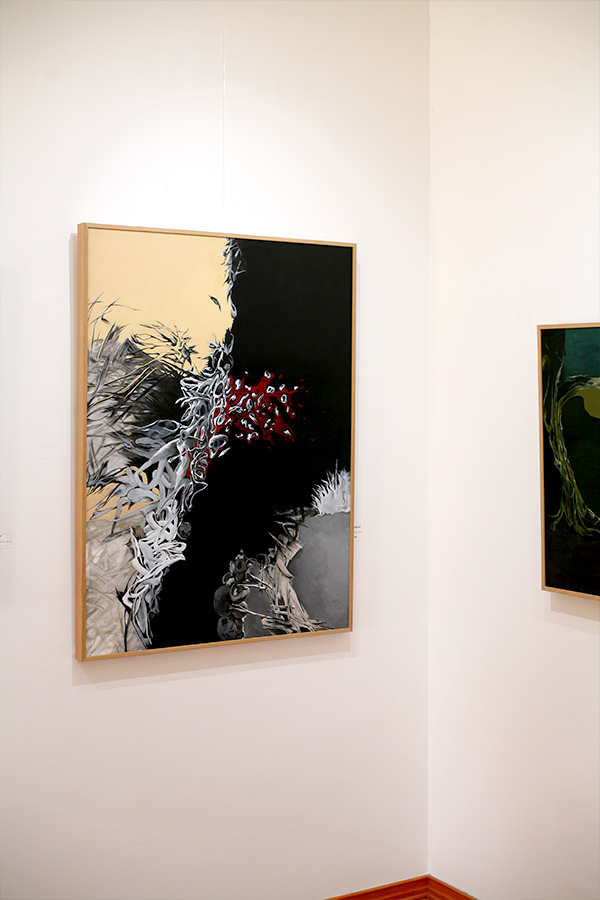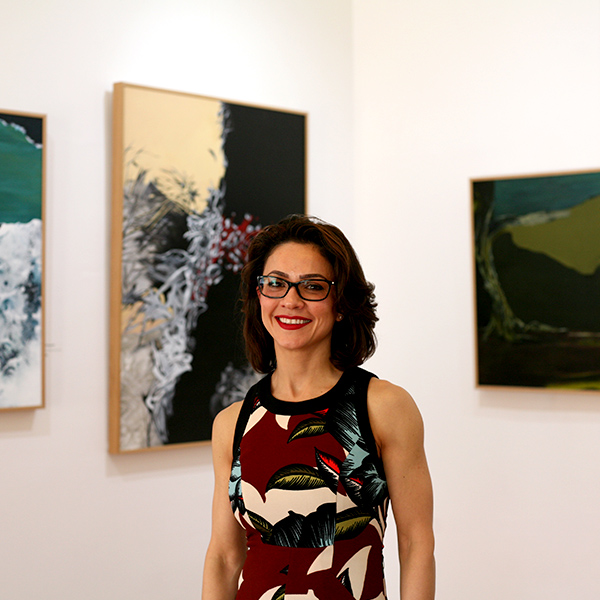A tai chi master, a painter, and a person – Nazli Jianfar is a South Australian artist whose work is imbued with her former life in Iran.
Introducing: Nazli Jianfar
Black is the anti-colour, the non-colour, the absence of light, the absence of hope. In Nazli Jianfar’s work it is present in fine lines and edging, wrought in acrylic ink for precision, and in sombre shades locked in conflict with bolder colours struggling to break through.
Nazli graduated from the Azad University of Fine Art and Architecture in Tehran and was part of group exhibitions in Iran. She emigrated to Adelaide to join her Iranian husband in 2007. Now her first solo exhibition, A Private Voice, is showing at Mrs Harris’ Shop, a Torrensville gallery.
A Private Voice by Nazli Jianfar
At Mrs Harris’ Shop,
36 Jervois Street
Torrensville SA 5031
Exhibition runs until Sunday, 28 October.
After Iran’s Islamic Revolution in 1978-79, women were forced to cloak themselves from head to foot in black, the non-colour for non-equal people.
Black was the uniform of the “morality police” – extremist Muslim vigilantes who patrolled the streets and swooped on any woman who dared to wear a wayward bright scarf, makeup of any kind or what was deemed to be immodest clothing.
Nazli was thrown into overnight detention twice for such violations and narrowly escaped being whipped when the morality police invaded a private party she was attending with her husband.
“I have friends who were lashed, I have seen the photos of the scars on their backs,” she said.

Black is ever-present in Nazli’s mind and memory of Iran
Both Nazli’s father and grandfather were imprisoned for long periods for their political beliefs, putting enormous pressure on Nazli’s mother.
“Your whole life, you are angry. It’s not about being frightened, it’s about being suppressed,” she said.
“When I was in detention, I felt very strong. The whole time I was calming the other girls. But when I saw my mum who had come to get me the next day, I burst into tears.
“In Iran, your father or your husband has to sign your passport, you cannot rent a room or go to a hotel without their consent. In Iran, you are not a person, you belong to someone.”
“I had so much rage in me. I couldn’t control it until I started tai chi. My master taught me to calm myself.”
And Nazli didn’t just “do tai chi” – she went on to compete in national championships in Iran then became the first woman to represent Iran in the sport at the seventh World Wushu Championships in Macau in 2003.
She started teaching tai chi in Adelaide two years ago and last year won a gold and silver medal at the National Tai Chi Championships in Sydney.
That drive to learn and achieve, to overcome obstacles and find the best in life, shines through in Nazli’s skilful and precise yet passionate art.

Nazli Jianfar
A series of finely observed pencil drawings of male and female nudes serves as an antidote to the emotional tension of the paintings in A Private Voice.
Delicate lifelines trace the models’ bodies as they pose serenely amongst intriguing backgrounds that tell their life stories, taking the genre beyond the depiction of life models as archetypal human bodies.
The freedom to depict the human body is just one of the many joys of life in Australia for Nazli. She was able to leave the country to join her Iranian husband, who came to Australia before her as a skilled migrant.
“I found it quite natural here, I felt like a human, not just a woman,” she said. “I have found people in Adelaide to be very lovely. I love to chat with them, even when I’m walking my dog or sitting at a bus stop. I learn a lot from them.”
After the Iranian revolution, many forms of personal expression that did not conform with religious orthodoxy were banned, including visual art, music and books, which became items of precious contraband, smuggled between trusted friends.
Nazli was a voracious reader as a child and was encouraged to read widely by one of her art lecturers at university.
“He said what we absorb stays with you – you might not be able to express it back, but it will come out in your work.”
That intellectual grounding – and the harsh experiences of her early life – inform Nazli’s surrealist landscapes and dark palette, taking her work beyond technical mastery and surface aesthetic appeal.
“It’s my life, we had to wear black or navy all the time. Now I am bringing the colour back – but you will always see a dark side,” she said.
Now Nazli is an emphatically vibrant and lively presence, revelling in the freedom that life in Australia offers but working through the traumas she and her family suffered – of war, revolution, suppression, political imprisonment, and vast geographical separation, through her striking and complex art.










